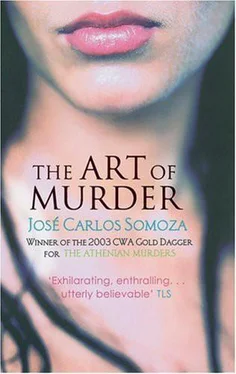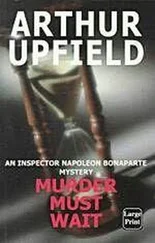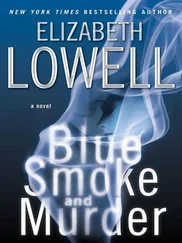Jose Somoza - Art of Murder
Здесь есть возможность читать онлайн «Jose Somoza - Art of Murder» весь текст электронной книги совершенно бесплатно (целиком полную версию без сокращений). В некоторых случаях можно слушать аудио, скачать через торрент в формате fb2 и присутствует краткое содержание. Жанр: Триллер, на английском языке. Описание произведения, (предисловие) а так же отзывы посетителей доступны на портале библиотеки ЛибКат.
- Название:Art of Murder
- Автор:
- Жанр:
- Год:неизвестен
- ISBN:нет данных
- Рейтинг книги:4 / 5. Голосов: 1
-
Избранное:Добавить в избранное
- Отзывы:
-
Ваша оценка:
- 80
- 1
- 2
- 3
- 4
- 5
Art of Murder: краткое содержание, описание и аннотация
Предлагаем к чтению аннотацию, описание, краткое содержание или предисловие (зависит от того, что написал сам автор книги «Art of Murder»). Если вы не нашли необходимую информацию о книге — напишите в комментариях, мы постараемся отыскать её.
Art of Murder — читать онлайн бесплатно полную книгу (весь текст) целиком
Ниже представлен текст книги, разбитый по страницам. Система сохранения места последней прочитанной страницы, позволяет с удобством читать онлайн бесплатно книгу «Art of Murder», без необходимости каждый раз заново искать на чём Вы остановились. Поставьте закладку, и сможете в любой момент перейти на страницу, на которой закончили чтение.
Интервал:
Закладка:
'Tomorrow I'll begin eternal life.'
After the signing session, she had been taken to her hotel. There was a security guard keeping watch on her, even in her room, because now she was an immortal work of art. And they have to prevent at all costs any immortal work dying, she thought, smiling to herself.
It had happened around five in the afternoon. Gerardo and Uhl had taken her to the Old Atelier, the sprawling complex of buildings the Foundation used in the Plantage district. There they had painted her in one of the cabins with two-way mirrors in the basement. They had let her dry, then put on a padded dress and led her to the signing room. Nearly all the 'Rembrandt' works were there. Clara saw some incredible sights: two models hanging by their ankles next to a constructed ox carcass, a regiment of bloody riders; a wonderful dream mixing Dutch Puritan clothes and the nakedness of mythological flesh. She saw Gustavo Onfretti nailed to a cross, and Kirsten Kirstenman stretched out on an operating table. She met for the first time the two old men of Susanna; one of them gaunt, with a penetrating gaze, the other as solid as a wardrobe. She recognised the first of them immediately, despite the paint obscuring his face: he was the old man she had seen being checked in the room next to hers at Schiphol airport. Both of them were wearing flowing robes, and the tones of their faces denoted lasciviousness and liver problems. She hardly had time to speak to them, because she had to be placed in position on the podium: naked, crouching at the feet of the First Elder, completely Susanna, completely defenceless.
A long time went by before Van Tysch and his assistants appeared. Clara thought Gerardo and Uhl were among them. Perhaps also there was the black assistant she had seen getting out of a van a fortnight earlier. Curled up on the ground, she saw a procession of women's calves, and barefoot men and women go past: probably sketch models. Then the dark tubes of Van Tysch's black trousers. Phrases in Dutch. Van Tysch's voice. Other voices. The sound of implements. Someone had switched on a bright light and was shining it on her. Then the buzz of the electric tattoo needle.
Clara had been signed on many occasions. She was well aware of the physical sensation when a painter signed part of her body with any kind of delicate instrument. But this was completely different. It was like the first time. To be a Van Tysch original was different. She felt as though she had reached an end, had been finished. At twenty-four, she was complete. But beyond this ecstatic feeling of being finished, who would understand her? Who could go with her in her journey into darkness? Who would help make her transition to the sublime an easy, quick one? All at once, in the split second before the tattoo needle touched her, she stopped thinking and wishing. She felt a kind of empty dark sensation inside herself, as if she had stepped outside her body and had switched off the light. Now I'm thinking like an insect: she remembered Marisa Monfort's advice when she was priming her memories. Now I'm a real work of art.
Something was tickling her left ankle. She could feel the needle circling round as it drew 'BvT' on her bone. Of course she did not even look at Van Tysch while he was doing this. She knew he wasn't looking at her either. And now in the hotel, on that first night, she was waiting.
Tomorrow was the day. Tomorrow she would be on show for the first time.
When at last she fell asleep, she dreamt that she was once again outside the door to the attic in the Alberca house, except that she wasn't an eight-year-old girl, but a twenty-four-year-old woman who had been signed on the ankle by Van Tysch.
Even so, she was desperate to get into the attic. 'Because I haven't seen the horrible yet. I'm a Van Tysch painting, but I still haven't seen the horrible.' She went up to the door and yanked it open. Someone stopped her with a hand on her arm. She turned, and saw her father. He looked terrified. He was shouting something as he tried to prevent her going into the room. Gerardo was standing next to him, shouting as well. It was as though they wanted to save her from a mortal danger.
But she struggled free from all the hands keeping her back, and ran towards the dark depths.
6
Because in the depths there is only darkness.
April Wood opened her eyes. At first she could not remember where she was or what she was doing there. She raised her head and saw she was in a broad bed in the middle of a darkened room. She slowly realised this must be the Vermeer Hotel, and that she had arrived in Amsterdam to watch the Maestro signing his works at the Old Atelier. In theory, the session was private, but Foundation staff could attend if they so wished. Wood wanted to see the finished works in their poses, to get to know them as well as the Artist doubtless did. As soon as the signing was over, she had come back to the hotel and gone to bed, so doped up with sleeping pills she had not even taken off her clothes. She was still wearing the tight black suit with a silver thread she had gone to the Atelier in. She glanced at her watch: 20.05 on Friday 14 July, 2006. Less than twenty-four hours to the opening of 'Rembrandt'.
There was a big mirror on the far wall of the room. She got up and considered herself in it. She looked dreadful. She remembered she had almost fallen unconscious. The imprint of her head still hollowed the pillow.
She unzipped her suit, stepped out of it and threw her clothes on the floor. The bathroom was wall-to-wall marble. She pressed the light switch and turned on the shower. As a warm jet of water sprayed over her body, she mentally went over what she knew. What did it amount to? A lot of opinions, and thirteen terrible possibilities.
After talking to Hirum Oslo on Tuesday, she had called several other critics from London. She had given them all the same excuse, except for Oslo (why did you tell him the truth, she wondered): that she had to draw up a list with the most valuable, intimate and personal works by Van Tysch in order to place the security people properly. So far, none of the critics had refused to give their opinion. The Maestro, on the other hand, had refused to see her. April could not object: he was her boss, and his only obligation was to pay her. 'He's very tired,' said Stein, to whom she had spoken the previous afternoon in the Atelier. 'After Saturday, he's going to shut himself away in Edenburg. He doesn't want anyone to see him.' Stein himself seemed exhausted. 'We've reached the end,' he had told Miss Wood. 'The end of a creative act is always sad.'
Miss Wood stepped nimbly out of the shower. The huge hotel towels were like bearskins. As she wrapped herself in one, she glanced down at the electronic weighing scales at her feet. She forced herself to avoid the temptation. It was not too much effort: the temptation was there like a dull ache, an uncomfortable sensation lodged somewhere in her brain. But Miss Wood knew that if she gave in over small things like that, she would immediately be defeated by much bigger ones. She did not want to know what she weighed: or rather, she did, but she was not going to find out. She knew she had put on weight, she could feel it in the outline of her hips and waist, but she had decided to diet and only have fruit juice with vitamins. And to concentrate even harder on her work.
She took a deep breath, left the bathroom, sat down on the bed still draped in the towel, and breathed in deeply one, two, three more times. So long as she was wrapped in the towel, there was no need for her to look at herself in the mirror. She was fat as a pig, a real sight, but the towel preserved her dignity. Of course, she could always get dressed, that is, to try to reach the wardrobe where her clothes were, and disguise the revolting mass of blubber in a blouse and trousers. She preferred not to think of what might happen if she could not fit into her trousers, if the zip could not overcome the rolls of fat.
Читать дальшеИнтервал:
Закладка:
Похожие книги на «Art of Murder»
Представляем Вашему вниманию похожие книги на «Art of Murder» списком для выбора. Мы отобрали схожую по названию и смыслу литературу в надежде предоставить читателям больше вариантов отыскать новые, интересные, ещё непрочитанные произведения.
Обсуждение, отзывы о книге «Art of Murder» и просто собственные мнения читателей. Оставьте ваши комментарии, напишите, что Вы думаете о произведении, его смысле или главных героях. Укажите что конкретно понравилось, а что нет, и почему Вы так считаете.












